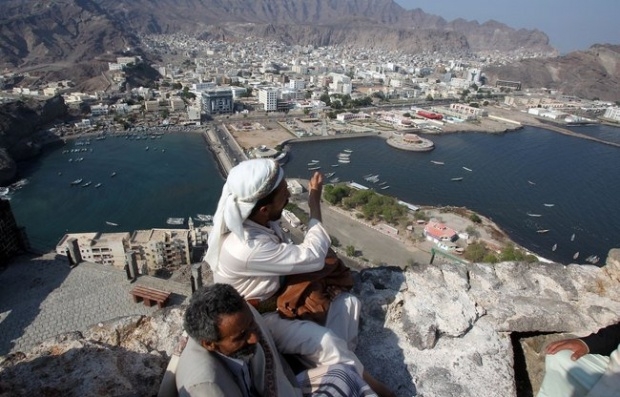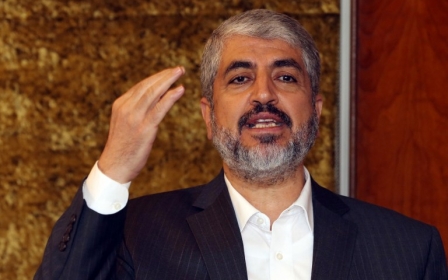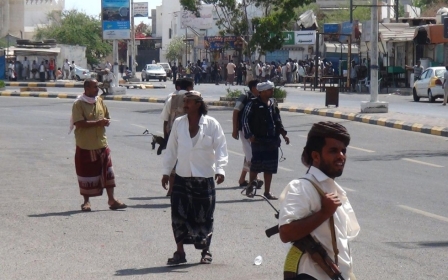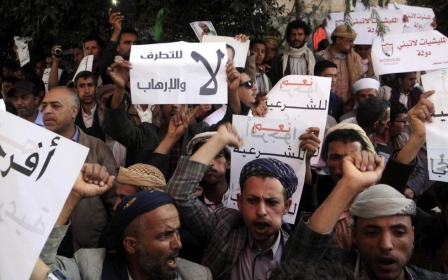Yemenis divided over capital: Can Aden replace Sanaa?

SANAA - Dark clouds filled the early morning skies and empty streets en route to Sanaa's International Airport.
After a security check at one of the points, Mohammed Ahmed, a young taxi driver warned that: “Mahfish hakuma”. This translates to, “No government, [only Houthis]” and is a pretty accurate reflection of things in parts of the Yemeni capital at present.
The Houthis, a Shiite militia, first stormed the capital back in September 2014 when they forced President Abd Rabbuh Manṣur Hadi to backtrack on economic reforms and fire his prime minister. While the UN-backed peace deal called for the Houthis to withdraw, they have continued to hold sway in the capital.
For months, checkpoints that were previously manned by the government forces have been largely manned by the Houthis who don Yemeni army uniforms with a ‘sarkha’, or Houthi slogan, on their guns. They inspect all passing vehicles carefully, before letting traffic pass through.
The situation has since only become further polarised and in January the president and prime minister resigned within hours of one another, due to Houthi pressure. The Houthis then placed the pair under house arrest and looked set to set up their own alternative government.
Hadi, however, managed to flee south to Aden, where he later rescinded his resignation, denounced the coup, and according to quotes from his aide declared the southern port city Yemen’s capital.
This left the Houthis’ revolutionary committee the de facto government of the north. On Thursday afternoon, the infuriated Shiite rebels attacked the presidential palace in Aden twice, in an alleged effort to derail Hadi’s plans to consolidate the government from the southern port city. The president was forced to evacuate from his residence, and his whereabouts have been unknown ever since.
Earlier, the same morning clashes erupted between forces loyal to the former president Saleh and Hadi’s forces at Aden’s International Airport, a week after the Special Security Forces' Abdul Hafez al-Saqqaf refused to obey Hadi’s orders to step down.
Many in Yemen and abroad wonder where the true power in the country lies and whether or not Hadi’s hopes of making Aden Yemen’s new capital are realistic.
International pressure
The Houthi takeover has been shunned by the lion’s share of Yemeni political groups, as well as the international community.
Nasserists, the pro-Muslim Brotherhood Islah party, as well as several Sunni parties, have all been in firm opposition to the Houthi moves, which have also been opposed by Yemen’s Southern Movement that is strong in Aden and wants autonomy if not outright independence from the north.
A string of politicians were subsequently caught trying to flee south to Aden, which used to be the capital of the People's Democratic Republic of Yemen (PDRY) after independence from the British, until the unification with North Yemen in 1990.
Internationally, the Gulf Cooperation Council, the UN and the US have all voiced their opposition to the Houthis' committee and said they would continue to support Hadi. Even Iran, which is seen as having supported the Houthis at least in some respect, appears to have admitted that their swift ability to seize control caught them by “surprise”.
Four Gulf countries - Qatar, Kuwait, Saudi Arabia and the UAE - went even further by closing their Sanaa embassies in April and re-opening them in Aden. The US, the first to shut offices citing security concerns, said it wouldn’t open an Aden base but would continue to back Hadi.
It now appears that the pressure could at long last be getting to the Houthis and after two months; the Houthis this week lifted the house arrest on prime minister Khaled Bahah and other ministers from the former government. The easing up came on the back of successful negotiations led by the UN special envoy to Yemen, Jamal Benomar.
Yemenis divided
Nonetheless, Yemenis have been perplexed by the idea of moving the capital to Aden and many find the relocation irrational. Others suspect the move could be temporary at most, and forced only due to the Houthi occupation of Sanaa.
Fernando Carvajal, a US-based Yemen analyst, warned that relocating the capital to Aden would require a constitutional change.
Without a parliament, and with a constitution undermined by both the Houthis and Hadi, Carvajal said the president did not have the cabinet of ministers or the financial resources necessary for administration from Sanaa or Aden.
“The idea of moving the capital was initially presented by Southern delegates at the National Dialogue Conference back in March 2013. They believe this could be done as part of the six-region federalism plan proposed by some and adopted by president Hadi,” he said.
But the Southern population, which is largely against unity, has rejected the idea of federalism and Hadi's move to make Aden the "capital of Yemen".
For Abdo Elfgeeh, a business investor in Sanaa, the relocation is fraught with uncertainties.
“This is not a simple black and white issue,” he said.
“Moving the capital will send a wrong message to people of Sanaa and surrounding areas that the regime has left them alone to face the Houthis and defend the South.”
But, Qaid Bn Toaiman, a student from Marib, said Aden is still a better alternative to other cities.
“Taiz is overcrowded, lacks infrastructure and adequate water resources,” he said of the southwestern city.
“Hadi is able to run the government from Aden but he still faces some challenges that may disturb him,” he added.
But Niyazi al-Ashwal from the Ministry of Public Works and Highways in Sanaa estimates a minimum of eight years would be needed to build the right infrastructure for a full-blown relocation to Aden.
“This will require preparation of the headquarters of all ministries, the central bank, the presidency, parliament, state institutions, embassies and housing for employees,” he told MEE.
However, Elfgeeh argues that such a grand plan would not be necessary for the capital to be relocated on a short-term basis.
Can Hadi rule from Aden?
While Hadi is a Southerner, he is widely viewed as a traitor due to his support for unity, going against some factions within the Southern Movement, which is divided on unity.
The faction led by Salim Ali Beidh are keen separatists and oppose Hadi, while other factions prefer federalism or a revamped union with the north.
Carvajal said: “Hadi has yet to publicly address the people since his arrival in Aden. It is still unclear what the relationship with Hirak will be and which faction will actually accept him. Some factions loyal to al-Beidh cannot accept him.”
Ahmed Mohsin, a member of the Southern Movement said Hirak members fear that Hadi’s flight south will allow Aden to become the capital. This is against their wishes, as they primarily want to be rid of the north and do not want to simply have greater influence, he explained.
In addition to the internal rift between the Southern Movement factions, Beidh pointed out that a majority of the armed and security forces are still loyal to either the Houthis or former President Ali Abdullah Saleh, who has been accused of colluding with the Shiite militias against Hadi.
President Hadi’s frailty rings true, particularly since Aden’s Special Forces commander (SSF) Abdel Hafez al-Saqqaf refused to step down last week and insisted he would only take directives from the presidential council in Sanaa.
Tensions have continued to spiral with many local Twitter users saying that they had begun bracing for civil war. Haykal Bafana, a Sanaa-based lawyer, said on Twitter that: “Hundreds of heavily armed Bani Hilal tribal militia from Shabwa arrived today in Aden at Hadi's request.”
Hadi also called for 20,000 Southerners to join the military in a recruitment drive which commenced Sunday and is said to run for a week, the Yemen Times reported.
Commenting on Thursday’s clashes, Bilal Gulamhussein, a writer and historian based in Aden, said this was an attempt by Hadi’s forces to retaliate after al-Saqqaf defied his orders to step down.
“Things look calm now,” Gulamhuseein said on Thursday evening, adding that “Hadi’s forces have taken over the Central Security Forces camp in Khormaksar district.”
“But we don’t know what they [Saleh] are planning. Nobody in Yemen can predict what will happen next.”
The Saleh dimension
Not surprisingly, Hadi’s announcement of Aden as the capital has also managed to enrage former president Ali Abdullah Saleh, who continues to wield significant influence.
In a speech on Monday from his Sanaa residence, Saleh accused Hadi of conspiring with the separatists. He said Hadi has only one way out and that is via Aden through the Red Sea.
Conversely, the former president has been criticised for directly supporting the Houthis and accumulating wealth of up to $60 bn, in a UN report, released last month.
But while Saleh undoubtedly has several cards left to play, Mohsin, the Southern Movement supporter, said that Saleh’s dreams of uniting Yemen were ridiculous.
“He thinks it is 1994. People in Aden no longer want unity, and if that happens it will be a disaster,” he said.
The Southern Movement, however, still has a long way to go before it can go it alone, Elfgeeh explained.
“Separation will require a lot more [than just moving the capital] - mainly [separation needs] a public sentiment and strong Southern leadership to back that up,” he said. “This doesn't exist so far.”
“It will also depend on Houthis and other northern components' conducts, especially towards the Southerners and their demands.”
Whatever the long-term outcome, the short-term scenario is likely to spell more turbulence.
Carvajal insists moving the capital will ruffle a few feathers and cause further fracturing of the South. He added that Shabwa and Hadhramout cannot afford to allow Aden to gain any power over them or become the decision maker in the future shape of a Southern state, leaving both the Northern and Southern camps in limbo for now.
New MEE newsletter: Jerusalem Dispatch
Sign up to get the latest insights and analysis on Israel-Palestine, alongside Turkey Unpacked and other MEE newsletters
Middle East Eye delivers independent and unrivalled coverage and analysis of the Middle East, North Africa and beyond. To learn more about republishing this content and the associated fees, please fill out this form. More about MEE can be found here.




